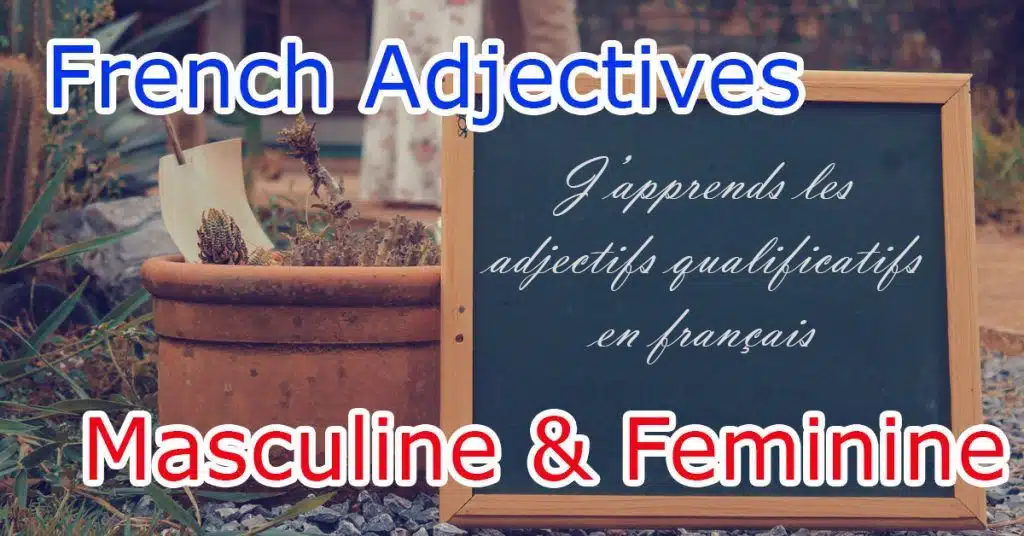French verbs from A1 to C2 level with example sentences!
Are you learning French and looking to improve your verb game? Whether you’re a complete beginner or aiming to perfect your French, I’ve got a great resource for you! In this post, we’ll go through a list of 60 essential French verbs, organized by proficiency levels from A1 to C2.
Each verb comes with two example sentences to help you understand how to use them in context. Let’s dive in!
Note: This list is not exhaustive, but covers a good variety of common verbs for each skill level.
A1 (Débutant)
These verbs are perfect for beginners just starting to learn French.
- être (to be)
Je suis étudiant(e). = I’m a student.
Mes parents sont en vacances. = My parents are on vacation. - avoir (to have)
J’ai un chat et deux chiens. = I have a cat and two dogs.
Elle a une grande maison. = She has a big house. - aller (to go)
Je vais à la boulangerie. = I’m going to the bakery.
Nous allons au cinéma ce soir. = We are going to the cinema tonight. - faire (to do/make)
Je fais mes devoirs. = I do my homework.
Il fait souvent des erreurs. = He often makes mistakes. - parler (to speak/talk)
Je parle français et allemand. = I speak French and German.
Ils ne parlent jamais de toi. = They never talk about you. - habiter (to live)
J’habite à Londres. = I live in London.
Mon frère habite à Stockholm. = My brother lives in Stockholm. - aimer (to like/love)
J’aime les livres d’histoire. = I like history books.
Julie n’aime plus Martin. = Julie doesn’t love Martin anymore. - manger (to eat)
Je ne mange pas le soir. = I don’t eat in the evening.
Tu as déjà mangé ? = Have you eaten yet? - venir (to come)
Je viens souvent ici. = I come here often.
Ils viendront à 20 heures. = They will come at 8pm. - prendre (to take)
Je prends le train demain. = I’m taking the train tomorrow.
Il prend toujours un dessert. = He always takes dessert.
A2 (Élémentaire)
Level up your French with these verbs for everyday situations.
- choisir (to choose)
J’ai choisi une veste bleue. = I chose a blue jacket.
Ils ont choisi ce film d’action. = They chose this action movie. - comprendre (to understand)
Je te comprends très bien. = I understand you very well.
Ils ne comprennent pas cet exercice. = They don’t understand this exercise. - devoir (to have to/must)
Je dois partir à 15 heures. = I must leave at 3pm.
On doit faire des efforts. = We have to make an effort. - mettre (to put)
J’ai mis les clés dans le tiroir. = I put the keys in the drawer.
Attends, je mets mon manteau. = Hold on, I’m putting on my coat. - pouvoir (to be able to/can)
Je ne peux pas venir ce soir. = I can’t come tonight.
Nous pouvons nous le permettre. = We are able to afford it. - vouloir (to want)
Je veux venir avec vous. = I want to come with you.
Elle veut se marier. = She wants to get married. - savoir (to know)
Je sais que je l’aime. = I know I love him/her.
Il sait conduire. = He knows how to drive. - voir (to see)
J’ai vu une araignée dans la chambre. = I saw a spider in the room.
Tu vois cet énorme nuage là-bas ? = You see that huge cloud over there? - acheter (to buy)
J’achète souvent des légumes. = I often buy vegetables.
Lucie a acheté un gâteau. = Lucie bought a cake. - attendre (to wait)
J’attends le bus. = I’m waiting for the bus.
Attendez-nous, s’il vous plaît. = Please wait for us.
B1 (Intermédiaire)
Improve your conversations with these intermediate verbs.
- commencer (to start)
Le cours commence à neuf heures. = The class starts at nine o’clock.
Je commencerai plus tôt demain. = I’ll start earlier tomorrow. - connaître (to know)
Je connais très bien ses parents. = I know his/her parents very well.
Ils ne connaissent pas mon frère. = They don’t know my brother. - penser (to think)
Je pense qu’il a raison. = I think he’s right.
Julien n’y a pas pensé. = Julien didn’t think about it. - travailler (to work)
Elle travaille dans une banque. = She works in a bank.
Tu travailles demain ? = Do you work tomorrow? - utiliser (to use)
Je n’utilise jamais cette machine. = I never use this machine.
J’utilise du sucre pour cette recette. = I use sugar for this recipe. - essayer (to try)
Elle essaye d’apprendre le chinois. = She’s trying to learn Chinese.
On a essayé de vous appeler. = We tried to call you. - finir (to finish)
J’ai fini mon tableau. = I finished my painting.
Ils finissent leur repas. = They finish their meal. - perdre (to lose)
J’ai perdu mon portefeuille. = I lost my wallet.
Ils ont perdu la finale du tournoi. = They lost the tournament final. - répondre (to answer)
Ils ne m’ont pas encore répondu. = They haven’t answered yet.
Répondez à cette question s’il vous plaît. = Please answer this question. - vivre (to live)
Je ne vis pas très loin d’ici. = I don’t live far from here.
Ils vivent dans une grande maison. = They live in a big house.
B2 (Intermédiaire avancé)
Get more precise with these advanced verbs.
- décider (to decide)
J’ai décidé de les aider. = I decided to help them.
On a décidé de partir demain. = We decided to leave tomorrow. - expliquer (to explain)
J’ai expliqué la situation à la police. = I explained the situation to the police.
Ce texte est difficile à expliquer. = This text is difficult to explain. - lire (to read)
Je lis deux livres par mois. = I read two books a month.
Mes enfants lisent souvent. = My children often read. - écrire (to write)
J’ai écrit un roman. = I wrote a novel.
On n’écrit plus de lettres. = We don’t write letters anymore. - ouvrir (to open)
N’ouvrez pas cette fenêtre s’il vous plait. = Please don’t open this window.
Marc a ouvert un nouveau restaurant. = Marc has opened a new restaurant. - recevoir (to receive)
Tu as reçu mon message ? = Did you receive my message?
Les employés ont reçu un cadeau. = The employees received a gift. - réussir (to succeed)
Mon fils a réussi son examen. = My son passed his exam.
Les pompiers ont réussi à le sauver. = The firefighters succeeded in saving him. - rire (to laugh)
On rit beaucoup au bureau. = We laugh a lot in the office.
Ils ont ri après sa chute. = They laughed after his fall. - suivre (to follow)
Une voiture m’a suivi sur le retour. = A car followed me on the way back.
Je le suis sur YouTube. = I follow him on YouTube. - découvrir (to discover)
On a découvert un trésor. = We’ve discovered a treasure.
Ils ont découvert une nouvelle planète. = They’ve discovered a new planet.
C1 (Autonome)
Achieve fluency with these verbs for more complex ideas.
- apparaître (to appear)
Un magnifique arc-en-ciel est apparu. = A beautiful rainbow appeared.
La Vierge est apparue à Lourdes. = The Virgin appeared at Lourdes. - atteindre (to reach)
Elle a rapidement atteint le rivage. = She quickly reached the shore.
Ils atteindront leurs objectifs. = They will reach their goals. - battre (to beat)
Ils ont battu les favoris. = They beat the favorites.
Elle me bat toujours aux échecs. = She always beats me at chess. - admettre (to admit)
Je n’admets pas cette situation. = I don’t accept this situation.
Vous devez admettre vos erreurs. = You have to admit your mistakes. - construire (to build)
Je construis une piscine dans le jardin. = I’m building a swimming pool in the garden.
Ce pont a été construit en 1959. = This bridge was built in 1959. - développer (to develop)
Sophie développe un nouveau projet. = Sophie develops a new project.
Ils ont développé une idée originale de jeu. = They developed an original idea for a game. - interdire (to forbid)
Il est interdit de fumer ici. = It’s against the law to smoke here.
Je vous interdis de me parler. = I forbid you to speak to me. - reconnaître (to recognize)
Je reconnais cette chanson. = I recognize this song.
Paul reconnaît qu’il avait tort. = Paul recognizes that he was wrong. - se souvenir (to remember)
Nous nous souvenons de cette époque. = We remember those days.
Il se souvenait très bien de son enfance. = He remembered his childhood very well. - traduire (to translate)
Ce texte n’est pas encore traduit. = This text has not yet been translated.
Cette entreprise traduit toutes les langues. = This company translates all languages.
C2 (Maîtrise)
Master French like a pro with these high-level verbs.
- aborder (to approach)
Il faut aborder ce sujet délicatement. = This is a subject that needs to be approached delicately.
Un inconnu m’a abordé dans la rue. = A stranger approached me in the street. - apprécier (to appreciate)
J’apprécie beaucoup votre aide. = I really appreciate your help.
Ils ont apprécié votre présence. = They appreciated you being there. - envisager (to consider)
Nous envisageons de déménager. = We are considering moving.
Elle envisage de revenir en France. = She is considering returning to France. - maîtriser (to master)
Ses parents maîtrisent bien l’allemand. = His parents master German well.
Arnaud maîtrise les outils informatiques. = Arnaud is mastering computer tools. - négocier (to negotiate)
Ce contrat a été mal négocié. = This contract was badly negotiated.
Le gouvernement a négocié une paix durable. = The government has negotiated a lasting peace. - percevoir (to perceive)
Je perçois l’inquiétude de Bruno. = I can perceive Bruno’s concern.
Elle perçoit des allocations de chômage. = She receives unemployment benefit. - prétendre (to claim)
Il prétend être un riche héritier. = He claims to be a wealthy heir.
Je ne prétends pas être le meilleur. = I don’t claim to be the best. - résoudre (to solve)
Ce mystère n’a pas été résolu. = This mystery has not been solved.
Amandine résout des affaires criminelles. = Amandine solves criminal cases. - subvenir (to provide for)
Sa mère subvient aux besoins de sa famille. = His/her mother provides for the family.
Avant, je subvenais à ses besoins. = I used to provide for him/her. - transmettre (to transmit)
Le pape a transmis un message de paix. = The Pope transmitted a message of peace.
La grippe se transmet par l’air ambiant. = Flu is transmitted through the air.
Need a French tutor, click here, and get $10 USD italki credits with a $20 purchase, credited to your student wallet within 48 hours.
I hope this list helps you in your French learning journey! Keep practicing, and you’ll see improvement in no time. If you have any questions or need further explanations, feel free to leave a comment. You can also watch the video I did about this list of French verbs. Don’t forget to subscribe to my YouTube channel for more French tips and lessons!



